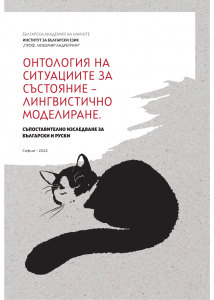Датив субъекта мнения и субъекта оценки в болгарском разговорном языке (на фоне русского)
Subject of Opinion and Subject of Evaluation Dative in Colloquial Bulgarian (as compared with Russian)
Author(s): Elena Yu. Ivanova, Galina Ivanovna Kustova , Svetlozara Leseva
Subject(s): Language studies, Language and Literature Studies, Applied Linguistics, Syntax, Lexis, Semantics, Pragmatics, Comparative Linguistics, Cognitive linguistics, Descriptive linguistics, Eastern Slavic Languages, South Slavic Languages, Translation Studies, Phraseology
Published by: Институт за български език „Проф. Любомир Андрейчин“, Българска академия на науките
Keywords: dative; experiencer; subject of opinion; epistemic subject; interpretative evaluation; perception predicates
Summary/Abstract: This paper examines Bulgarian colloquial constructions of the type illustrated in the example И твоята панама нещо ми синее! Дали наистина е така или е от снимката? (Your canvas, too, looks somewhat bluish to me! Is it really like that or is it just the picture?), where the dative pronominal clitic marks the so-called subject of opinion. To render this meaning, Russian employs epistemic verbs or other linguistic means indicating the subject of opinion, even in non-standard colloquial speech, e.g. И твоя панама что-то мне кажется синей. Это так действительно или только на фото? The study is focused primarily on dative-clitic constructions with sensory perception predicates, colour and taste predicates in particular, as classes representative of distant and contact perception. The goal is to determine the conditions under which the dative may be interpreted as the subject of opinion and what syntactic characteristics this interpretation correlates with. In addition, we describe nonstandard constructions where the dative pronoun denotes an entity that evaluates a state-of-affairs (evaluating subject). We show that corresponding constructions cannot be found even in non-standard colloquial Russian. The article is centered on written colloquial language constructions which demonstrate the emergence and active occasional use of language units and models potentially able to gain a foothold in the language. We assume that the models established in the standard language serve as a basis for the emergence of new formations such as the ones occurring in 426 online communication. The analyses of the different manifestations of the so-called subject of opinion and subject of evaluation are illustrated not only by Bulgarian examples, but also by their Russian translations, as well as by original examples from Russian online communication, which serve to reveal the semantic differences between the distinct functions of the dative constructions and to demonstrate the possible renditions of these constructions into Russian.
- Page Range: 404-426
- Page Count: 23
- Publication Year: 2022
- Language: Russian
- Content File-PDF

